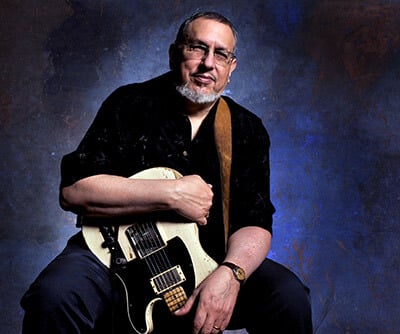
Tahoe Onstage photo by Larry Sabo
What happened to David Bromberg?
The question had been asked for decades. When he recently gave his answer, it sounded outlandish: “I thought I wasn’t a musician.”
This from the man who played alongside Bob Dylan, wrote songs with George Harrison and served as a studio guitarist for The Eagles, Ringo Starr, Carly Simon and Willie Nelson. The most complete Americana artist on the continent, he has recorded songs in every style: bluegrass, acoustic, Delta blues, ragtime jazz, fiddle stomps and jailhouse folk.
“I’ve always been kind of omnivorous, musically,” he said. His cover songs are remarkable because of the passion in their delivery. On records and onstage, Bromberg’s wit and humor are brilliant and hilarious. His fans are devout and musical peers undeniably respectful.
But he not only quit performing, he didn’t even pick up a guitar for 22 years.
What happened to David Bromberg?
“I stopped because I was burnt out,” Bromberg, 73, told Tahoe Onstage by telephone from his violin sales and repair shop in Wilmington, Delaware. “I must confess I was too stupid to realize it was burnout or I would have taken six months off or something, but I thought I wasn’t a musician. I wasn’t doing the things a musician does when I was off the road.
“I discovered that I wasn’t practicing. I wasn’t jamming and I wasn’t writing, so there’s nothing left. There’s nothing of a musician there.”
Early in his playing career, Bromberg had a raucous and popular fiddle tune, “New Lee Highway Blues.” Before he opened his shop, he went to violin-making school. Depending on the craftsman, he says, it could take a week to make a violin or it could take a year. Bromberg seems like the meticulous type.
“For me, going to violin-making school was actually not to learn to make them,” Bromberg said. “I did learn to make them so that I would understand how to look at them. What fascinated me was how someone could look at a violin and, without referring to the label, could just look at the outside of a violin and know when and where it was made and sometimes by whom. I wanted to be able to do that.”
When he puts his mind to something, going back to when he was a boy, Bromberg has had success.
He was in his mother’s car on the way to the train station on a trip into New York City when Bromberg had his first seminal breakthrough in music. He’d been listening to his older brother’s record that included Sleepy John Estes’ song “Working Man’s Blues.”

“I think I’ve always wanted to play anything I heard, or almost anything I ever heard, on guitar,” he said. “Blues was one of the first things that I started.”
“I was sitting in the back seat, I don’t know why, and I was hearing this track in my head. Then, all of a sudden, I could see how the introduction was done on the neck of the guitar. This was a real Eureka moment for me. There was no guitar handy. I didn’t get to a guitar for quite a few hours but when I got there, there it was. I was right, but I knew I was right. I could just see it and it was a very important moment in my growth as a musician.”
Another important moment came a few years later. It led to Bromberg learning a fingerstyle guitar technique from an esteemed bluesman Reverend Gary Davis. When Bromberg tells the story, it almost sounds like a one of his storytelling songs.
“I was walking down Bleecker Street one afternoon. It was probably a Saturday afternoon because I was going to college at the time. And there was a sandwich sign propped up outside of a club called The Dragon’s Den, which didn’t last much longer.
“But it said, ‘This afternoon, Reverend Gary Davis.’ I had heard of him. I had a record, one side of which was the Reverend and the other side was Pink Anderson. It’s a wonderful record, so I went in bought a ticket and it was just phenomenal playing. And beautiful singing. I think that a lot of people don’t really give him the credit he deserves as a singer. He was a very moving singer.
“Afterwards, I worked up my courage and asked him if he’d give me guitar lessons and to my surprise, he said yes: ‘Five dollars — bring the money, honey.’ ”
Bromberg became a master of guitar, along with Dobro, mandolin and fiddle.
Bluegrass was prominent on Bromberg’s early records, and the Dylan tune “Wallflower,” was a staple of his shows. Bromberg produced the John Hartford album “Aereo-Plain,” which kindled the newgrass genre. He performed with Jerry Garcia, Wille Nelson and, most notably, Jerry Jeff Walker. Bromberg recorded a singing and talking cover of Walker’s “Mr. Bojangles” on his 1972 album “Demon in Disguise.” In his compelling style, he described traveling with Walker who met the character dubbed Bojangles. Through that song, Bromberg was discovered by a legion of fans.
What happened to David Bromberg?
I learned about Bromberg after buying his next record, 1974’s “Wanted Dead of Alive.” One track was a live cover of Blind Willie McTell’s “Statesboro Blues.” I’d never heard a song sung with as much passion. From that moment, I was on what led to a mostly futile mission to purchase every David Bromberg album I could find. In the 1970s, ‘80s and ‘90s there were plenty of record stores but no internet.
Well, this: “When I moved to Wilmington, I actually hadn’t been planning to start playing again,” Bromberg said, “but the mayor and I had lunch together a few times and he told me that my street always used to have live music and he’d really love to see live music in town again. I figured the only way I could help with that would be to start a couple of jam sessions. I did that and some very good musicians started to show up. I just really enjoyed playing with these guys and since I was enjoying it I decided, what the hell, I’ll give it a shot.”
In 2007, Bromberg made a solo acoustic album, “Try Me One More Time,” which was nominated for a Grammy Award for Best Traditional Folk Recording.
[pullquote]When he moved to Wilmington and started making violins, I lost touch with him but I always remembered him. When he called, my manager said, ‘Some guy named David Bromberg called and wants to work with you,’ and I said, “yes, yes, yes!” – Keb Mo[/pullquote]
Bromberg may have won over new fans, but the old ones remembered him, too. When he made his next album, 2009’s “Use Me,” he sought contributions, recommendations and even productions from a number of high-profile musicians, many of whom he had worked with in the past.
“Luckily, I must not have been too much of a jerk,” Bromberg said. “It was wonderful and humbling.”
The artists included Keb Mo, Levon Helm, John Hiatt, Dr. John, David Hilgado and Widespread Panic, which often performs the Bromberg song “Sharon.”
Around that time, I happened to be interviewing Keb Mo in advance of a show at Lake Tahoe.
“David Bromberg came and found me,” said Keb Mo, who goes by Kevin Moore offstage. “It’s funny because I had met him back in the day when I played with Papa John Creech. I met him and saw his band. It freaked me out because his band would all of a sudden just turn into four different bands. He had all these horn players who could play fiddle and guitar. They could play all those instruments and just morph into them. They could turn into a bluegrass band and the next minute they could turn into James Brown, then they were doing rock.
“He was very kind when I met him. He said, ‘Look me up when you get to New York. I’m in the book.’ Back in the day, I would call him every now and then. When he moved to Wilmington and started making violins, I lost touch with him but I always remembered him. When he called, my manager said, ‘Some guy named David Bromberg called and wants to work with you,’ and I said, “yes, yes, yes!”
Bromberg has since made two more albums, the latest being 2016’s “The Blues, The Whole Blues and Nothing But the Blues.”
Since his comeback, Bromberg has appeared regionally at Reno’s Hawkins Amphitheater and in Nevada City. On Saturday, performed for the first time at Lake Tahoe in the the Crystal Bay Casino.
While he may play some of his early material, concertgoers should know Bromberg isn’t influenced by requests.
“I don’t plan my sets,” he said. “I don’t have a set list and as I finish a tune I generally know exactly what I want to play next. But if people shout stuff at me, I get confused. So I prefer it if they don’t do that. It’s like I have a string. You know, go on and let me follow that string.”
The modern day Bromberg says vocal lessons have helped him improve his singing. His guitar playing is solid, of course, but he is not apt to play frenzied solos.
“I still enjoy listening to other people play fast. I can’t do it anymore,” Bromberg said. “My hands won’t work like that anymore. You know, when you quit playing for a while, it’ll tell.”
Bromberg is on tour with a quintet: Mark Cosgrove, mandolin and guitar; John Kanusky, drums, Nate Growler, fiddle, and Suavek Zaniesienko on bass.
“I still occasionally play with a big band and it’s a lot of fun,” he said. “The big band is like a Rolls Royce or a Cadillac or a Duesenberg, — some great big wonderful vehicle and it gives you a great ride. The quintet is like a sports car. And it also gives you a great ride but a different one.”
No mater the vehicle, Bromberg delivers with a rare talent that audiences and listeners are enjoying once again.
“I was fine not using it,” Bromberg said. “I mean, I’m still surprised that I could walk away like that, but I could and I did. If I hadn’t moved to Wilmington and the mayor hadn’t said, ‘You know, I really wanted to hear live music downtown again’ — if that hadn’t happened — I might never have picked up a guitar again.”
— Tim Parsons
Related story: David Bromberg Quintet stuns Lake Tahoe.

One Response
This article has really got me going and I can’t wait to see him Saturday, don’t miss out on this one!